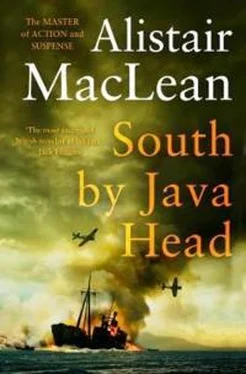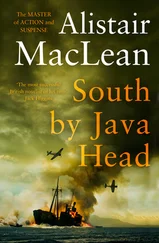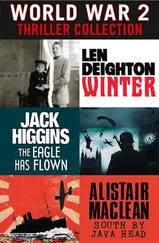Alistair MacLean
SOUTH BY JAVA HEAD
1958
CHOKING, DENSE, impenetrable, the black smoke lay pall-like over the dying city. Every building, every office-block and house, the intact and the bomb-shattered alike, was invested by it, swathed in the dark anonymity of its gently swirling cocoon. Every street, every alley, every dock-side basin was full of it, drowned by it. It lay everywhere, sulphurous and evil, scarcely moving in the soft airs of the tropical night.
Earlier in the evening, when the smoke had come only from the burning buildings in the city, there had been wide, irregular gaps overhead and the stars had shone in the empty sky. But a slight change of wind had obliterated these gaps, had brought with it the rolling, blinding oil-smoke from ruptured fuel tanks outside the city. Where the smoke came from, no one knew. Perhaps from the Kallang airport, perhaps from the power station, perhaps clear across the island from the naval base in the north, perhaps from the oil islands, from Pulo Sambo and Pulo Sebarok, four or five miles away. No one knew. All one could know was what one saw, and the blackness of that midnight was almost complete.
There was hardly any light now even from the burning buildings, for these were burnt out and utterly destroyed, the last embers, the last tiny flames flickering to extinction, like the life of Singapore itself.
A dying city, and already the silence of death seemed to have enveloped it. Every now and then a shell would whistle eerily overhead, to splash harmlessly into the water or to erupt in a brief roar of sound and flash of light as it smashed into a building. But the sound and the light, extinguished and smothered in an instant by the all-enveloping smoke, had a peculiarly evanescent quality, seemed a natural, an integral part of the strangeness and the remote unreality of the night and left the silence even deeper and more intense than it had been before. Now and again, out beyond Fort Canning and Pearls Hill, beyond the north-west limits of the city, came the irregular crackle of rifle and machine-gun fire, but that, too, was distant and unreal, a far-off echo in a dream. Everything that night had the same dream-like quality, shadowy and unsubstantial: even those few who still moved slowly through the rubble-strewn and almost deserted streets of Singapore were like the aimless wanderers of a dream, hesitant, listless and unsure, stumbling blindly through the swirling banks of smoke, little figures lost and hopelessly groping through the fog of a nightmare.
Moving slowly, uncertainly through the darkened streets, the small group of soldiers, perhaps two dozen in all, made their way down towards the waterfront like very old, very tired men. They looked like old men, they walked with the faltering steps and the bowed head and shoulders of old men, but they weren’t old men, the eldest of them was not more than thirty: but they were tired, terribly tired, tired to that point of uncaring exhaustion when nothing matters any more and it is easier to keep stumbling along than it is to stop. Tired and sick, wounded and ravaged by disease, their every action was now unthinking, automatic, their conscious minds had all but ceased to function. But complete mental and physical exhaustion carries with it its own blessing, its own drug and anodyne, and the dull, lack-lustre eyes staring emptily down at the ground beneath their trudging feet showed this beyond all doubt: whatever sufferings of the body they still endured, they had at least stopped remembering.
For the moment, at least, they no longer remembered the waking nightmare of the past two months, the privations, the hunger, the thirst, the wounds, the sickness and the fear as the Japanese had driven them down the endless length of the Malayan peninsula, over the now destroyed Johore causeway into the illusory safety of the island of Singapore. They no longer remembered their vanished comrades, the screams as some unsuspecting sentry was butchered in the hostile dark of the jungle, the diabolical yells of the Japanese as they overran hastily prepared defensive positions in that black hour before dawn. They no longer remembered these desperate, suicidal counter-attacks that achieved nothing but a few square yards of land bitterly, uselessly re-won for only a moment of time, afforded them nothing but the sight of the horribly maimed and tortured bodies of their captured friends and the civilians who had been just that little bit too slow in co-operating with the enemy. They no longer remembered their anger and bewilderment and despair as the last of the Brewster fighters and, latterly, the Hurricanes, had been driven from the skies, leaving them completely at the mercy of the Japanese air force. Even their utter disbelief at the news, five days ago, of the landing of the Japanese troops on the island itself, their bitterness as the carefully nurtured legend, the myth of the impregnability of Singapore, collapsed before their eyes – these, too, had vanished from their memories. They no longer remembered. They were too dazed and sick and wounded and weak to remember. But one day, soon, if they lived, they would remember, and then none of them would ever be the same again. But meantime they just trudged wearily on, eyes down, heads down, not looking where they were going, not caring where they would arrive.
But one man looked and one man cared. He walked along slowly at the head of the double column of men, flicking a torch on and off as he picked a clear way through the debris that littered the street and checked their direction of progress from time to time. He was a small, slightly-built man, the only one in the company who wore a kilt, and a balmoral on his head. Where the kilt had come from only Corporal Fraser knew: he certainly hadn’t been wearing it during the retreat south through Malaya.
Corporal Fraser was as tired as any of the others. His eyes, too, were red-rimmed and bloodshot, and his face grey and wasted with what might have been malaria or dysentery or both. He walked with his left shoulder far higher than the other, hunched up near his ear, as if he suffered from some physical deformity, but it was no deformity, just a rough gauze pad and bandage that a medical orderly had hurriedly stuffed under his shirt earlier in the day in a token attempt to staunch the bleeding from an ugly shrapnel wound. In his right hand he carried a Bren gun, and its weight of twenty-three pounds was almost more than his weakened body could carry: it had the effect of pulling down his right arm and dragging his left shoulder upwards, even nearer his ear.
The one-sided hunch, the balmoral askew on his head, the kilt flapping loosely about his wasted legs, made the little man appear grotesque and ridiculous. But there was nothing grotesque and ridiculous about Corporal Fraser. A Cairngorms shepherd to whom privations and gruelling exertions were of the very stuff of existence, he had yet to tap the last reserves of his will-power and endurance.
Corporal Fraser was still very much a going concern as a soldier – the very best type of soldier. Duty and responsibility weighed heavily with him, his own pain and weakness didn’t exist, his thoughts were only for the men who stumbled along behind, following him blindly. Two hours ago, the officer commanding their confused and disorganised company on the northern city limits had ordered Fraser to lead all the walking wounded, and those whom they could carry, out of the firing-line and back to some place of relative safety and quiet. Only a token gesture, the officer had known, and Fraser had known it also, for the last defences were caving in and Singapore was finished. Before the next day was through, every single man on Singapore island would be dead, wounded or prisoner. But orders were orders and Corporal Fraser trudged resolutely on, heading down for the Kallang creek.
Читать дальше
Конец ознакомительного отрывка
Купить книгу










